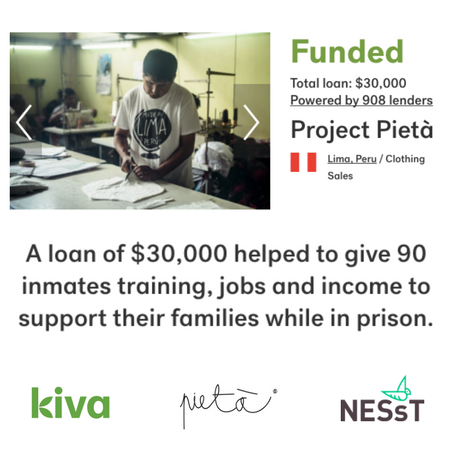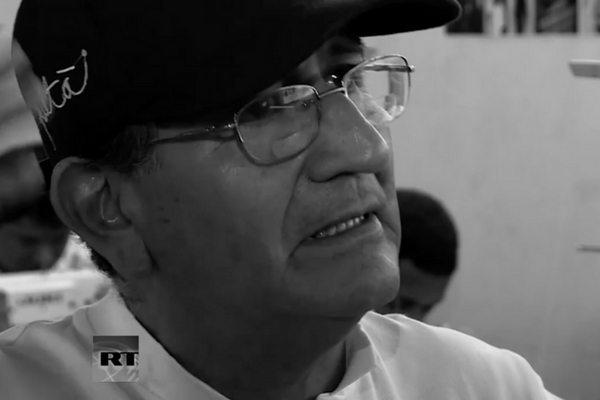En menos de una semana, ¡más de 900 personas confiaron en Pietà convirtiéndose en sus prestamistas y socios a través de la campaña organizada por NESsT y Kiva! No solo están haciendo posible esta visión, sino que la están fortaleciendo. Project Pietà es una empresa social y una marca de ropa que fue fundada por Thomas, un diseñador de moda, específicamente para ayudar a los reclusos a obtener ingresos de forma independiente para mantener a sus familias mientras están en prisión. También pueden adquirir una valiosa experiencia laboral que les ayude a conseguir un empleo cuando salgan en libertad.
A los reclusos se les paga una parte del precio de venta por cada unidad de ropa que producen, lo que se traduce en unos ingresos fiables que pueden enviar a sus familias. Tras su puesta en libertad, los ex reclusos pueden seguir trabajando con Pietà o buscar empleo en otras empresas con la recomendación y el apoyo de Pietà.
El préstamo Kiva ayudará Project Pietà a hacer crecer su negocio para emplear a más de 90 reclusos y ex reclusos en 2018. Pietà planea abrir una tienda minorista adicional en Perú y un nuevo centro de distribución para apoyar el aumento de las ventas en línea e internacionales. El préstamo se destinará al alquiler inicial, el mobiliario y los equipos informáticos necesarios para la puesta en marcha de estas nuevas instalaciones.
Gracias del Fundador, Thomas Jacob
"¡Hemos alcanzado nuestro objetivo! Gracias a todos los que forman parte de nuestra misión en todo el mundo. Es realmente increíble ver a tanta gente creyendo en Pietà y creyendo en cada ser humano. Gracias por el privilegio de vuestro amor y vuestro apoyo en nombre de todos los reclusos que forman parte del equipo de Pietà. Ahora, es el momento de que sigamos con este importante trabajo y desarrollemos Pietà a nivel local e internacional."
Lea sobre el contexto del trabajo de Pietà y por qué NESsT se vio obligado a seleccionar a Pietà para nuestro Portafolio Perú.
El sistema penitenciario en Perú
La escasa educación, los bajos salarios y la exclusión social son algunos de los factores que contribuyen al aumento de la delincuencia en Perú. Entre los graves problemas a los que se enfrentan estas cárceles están el hacinamiento y un alto índice de reincidencia.
Sin embargo, casi el 60% del total de la población reclusa son presos preventivos. Cada día, más de 31.000 personas son encarceladas sin haber sido condenadas por nada -en algunos casos hasta dos años- a la espera de juicio.
De todas las personas encarceladas, más del 70% de los reclusos y el 85% de las reclusas del sistema penitenciario peruano tienen hijos que mantener en casa y carecen de oportunidades para obtener ingresos legalmente mientras esperan o cumplen sus condenas.
La prisión preventiva y el encarcelamiento provocan la pérdida de ingresos y de empleo, así como de la capacidad de mantener a los miembros de la familia o de pagar la vivienda, lo que puede empujar a otras personas a la actividad delictiva. Americas Quarterly informa: "[La prisión preventiva] crea un círculo vicioso: muchos de los que se encuentran en prisión preventiva ya son pobres y no pueden pagar la fianza, lo que dificulta aún más su capacidad de obtener asesoramiento jurídico que pueda ayudarles a sortear los escollos del sistema judicial."
Pietà aborda directamente un factor clave que se ha descubierto que está correlacionado con la futura delincuencia: el futuro empleo. Con su trabajo, Pietà fomenta el uso de la rehabilitación a través de la inclusión económica que está allanando el camino para la reforma penitenciaria.
¿Quiénes son los socios Project Pietà?
Project Pietà colabora con reclusos de todos los orígenes: de 18 a 68 años, hombres, mujeres y transexuales, personas con condenas de dos años o 35, LGBTQ+, universitarios y analfabetos. Lo más resonante es el hecho de que el 95% de ellos tienen hijos, y el grupo más numeroso que trabaja con Pietà son padres adolescentes.
Pietà satisface este deseo de jóvenes y adultos que quieren aprender habilidades prácticas, obtener unos ingresos dignos para mantenerse a sí mismos y a su familia, y alcanzar su potencial. Pueden enviar dinero a sus hijos para que continúen sus estudios y apoyar a las madres que se quedan sin una fuente de ingresos clave. Algunos también pueden reducir sus condenas por cada día de trabajo que completan.
*En la foto, nuestros socios de las prisiones de Lurigancho y Santa Mónica.
"Muchos de los presos con los que trabaja Thomas Jacob [fundador de Pietà] no necesitan formación, ya que tenían experiencia en sastrería y confección antes de ser encarcelados. Coser es una habilidad muy extendida en Perú", afirma Jacob. Tejer y bordar es típico en provincias, y generalmente entre la clase más modesta, que es la más expuesta a la delincuencia. Pero a otros les ha cambiado la vida'". - The Guardian
Don Carlos, uno de los fundadores de Pietà, es un modelo ejemplar que ha hecho posible que más internos trabajen. Lleva 13 años en Lurigancho y su pasión y diligencia llevaron al desarrollo del taller de estampado que dirige y mejora cada día. Con Pietà, Don Carlos dirige a cuatro internos y supervisa el taller como persona de contacto con Thomas.
"Si no tienes algo con lo que ocupar tu tiempo, se te llena la cabeza y ahí es donde aparece el estrés y la enfermedad. Lo mejor es trabajar. Hay poca gente que crea en eso, pero deberíamos promover la oportunidad de trabajar." - Don Carlos
El fundador y detrás del nombre
Project Pietà clothing" es una idea de Thomas Jacob, un diseñador francés que se trasladó a Lima en 2011 para trabajar en una marca de moda peruana. Una visita fortuita a la cárcel vecina, Casto Castro, con un amigo que estaba enseñando francés a los reclusos abrió los ojos de Jacob a la posibilidad de un proyecto de ropa entre los muros de la prisión. Había algunas máquinas de coser y tejer en desuso. También había mucha gente maravillosa y abierta -muy lejos de la imagen que se tiene aquí de los presos- que quería salir adelante, aprender un oficio, trabajar, ganar dinero", dice Jacob. Procedían de entornos desfavorecidos y estaban en la cárcel sin nada que hacer. Sentí que era una posibilidad increíble para ellos crear algo fuerte', explica". - The Guardian
A lo largo de cinco años, Thomas ha entablado una estrecha relación con los reclusos, a los que a veces ve más que a sus familiares.
Su visión va más allá de proporcionar ingresos y oportunidades de desarrollo a los reclusos mientras están en la cárcel. Pieta también contrata a reclusos tras su puesta en libertad. A medida que sigan ampliando su negocio, Pieta ofrecerá formación y oportunidades de empleo en logística, operaciones y ventas para que los reclusos gestionen directamente la marca.
Más allá de su concepto comercial, Pietà representa mucho más que una marca de moda. Fundada y registrada por Thomas en 2012, comenzó a operar a tiempo completo en 2015, cuando dejó Chanel Latinoamérica para centrarse en Pietà. Su nombre -proveniente de la Piedad de Miguel Ángel- representa la resurrección, una segunda oportunidad para los reclusos que quieren luchar por sus familias y salir adelante.







